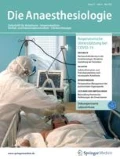Zusammenfassung
Fragestellung: Schnelles Erwachen und eine rasche Erholung der kognitiven Funktionen gehören zu den wesentlichen Auswahlkriterien von Anästhetika für ambulante Eingriffe. Die vorliegende Untersuchung befasst sich mit der Frage, ob die Erholung kognitiver Funktionen nach einer TIVA mit Remifentanil/ Propofol (P/R) rascher erfolgt als nach einer balancierten Anästhesie mit Sevofluran/Fentanyl (S/F).
Methodik: Die Untersuchung erfolgte an 60 Patientinnen (ASA I–II, 18–65 Jahre), die sich einer elektiven gynäkologisch-laparoskopischen Operation unterzogen sowie an 24 Probandinnen zur Erfassung narkoseunabhängiger Lerneffekte. Die Prämedikation erfolgte mit Midazolam, die Narkoseeinleitung mit Propofol und Atracurium. Gemäß Gruppenzuteilung wurden für die Narkose randomisiert entweder 1 μg/kg Fentanyl und 1,7 Vol.-% Sevofluran oder 0,25 μg/kg/min Remifentanil und 0,06 mg/kg/min Propofol zugeführt. Beatmet wurde mit 30% 02 in Luft, die postoperative Analgesie erfolgte mit Metamizol. An Testverfahren zur Erfassung kognitiver Funktionen wurden Worte-Lernen-, Stroop Farb-Wort-, Buchstaben-Ziffern-Ersetzen- und Vier-Felder-Test am Vortag der Operation und 30 min, 1 h, 2 h und 4 h postoperativ durchgeführt.
Ergebnisse: Nach Remifentanil/Propofol fanden sich signifikante kognitive Störungen bis zu 2 h (Worte-Lernen-Test) und 4 h (Stroop- und Buchstaben-Ziffern-Ersetzen-Test, Vier-Felder-Test) nach Anästhesieende. Nach Sevofluran/Fentanyl dauerten die kognitiven Störungen im Vier-Felder-Test gleich lange an, im Stroop- und im Buchstaben-Ziffern-Ersetzen-Test hingegen kürzer, während im Worte-Lernen-Test bereits nach 30 min keine Störungen mehr nachweisbar waren.
Schlussfolgerung: Die Dauer kognitiver Störungen in der frühen postoperativen Phase unterscheidet sich in Abhängigkeit vom verwendeten Anästhesieverfahren und vom jeweiligen Testverfahren. Zumindest in Teilaspekten der kognitiven Funktion scheint die Beeinträchtigung nach total intravenöser Anästhesie mit Remifentanil und Propofol länger anzuhalten als nach balancierter Anästhesie mit Sevofluran und Fentanyl. Für ambulante Eingriffe ist bedeutsam, dass in beiden Gruppen auch nach 4 h keine vollständige Erholung stattgefunden hat.
Abstract
Objective: In ambulatory anaesthesia the time required to recover from cognitive impairment should be as short as possible. The aim of this study was to compare the early cognitive recovery after remifentanil/propofol (R/P) and sevoflurane/fentanyl (S/F) anaesthesia.
Methods: Sixty patients scheduled for elective gynaecological laparoscopy and 24 female volunteers tested for the assessment of learning effects were investigated. After praemedication with midazolam anaesthesia was induced with propofol, atracurium and either 1 μg/kg fentanyl or 1 μg/kg remifentanil. For maintenance 0.25 μg/kg/min remifentanil and 0.6 mg/kg/min propofol (R/P) or 1.7 vol% sevoflurane (S/F) were given. Both groups were ventilated with 30% oxygen in air and received metamizol for postoperative analgesia. Verbal Learning Test, Stroop Colour and Word Interference Test, Digit Symbol Substitution Test and Four Boxes Test were performed the day before surgery and 30 min, 1 h, 2 h and 4 h after termination of anaesthesia.
Results: For remifentanil/propofol cognitive function was still impaired 2 h (Verbal Learning) and 4 h (Stroop, Digit Symbol Substitution and Four Boxes Test) after termination of anaesthesia. After sevoflurane/fentanyl anaesthesia cognitive impairment lasted the same duration in Four Boxes Test, but shorter in Stroop and Digit Symbol Substitution and could not be found in Verbal Learning Test.
Conclusion: The duration of cognitive impairment in the early postoperative period differed by the test procedures and the anaesthetic procedures used in this investigation. Recovery appeared to be faster after sevoflurane/fentanyl than after remifentanil/propofol at least in aspects of cognitive function.
Author information
Authors and Affiliations
Rights and permissions
About this article
Cite this article
Biedler, A., Juckenhöfel, S., Feisel, C. et al. Kognitive Störungen in der frühen postoperativen Phase nach Remifentanil/Propofol- und Sevofluran/Fentanylanästhesie. Anaesthesist 49, 286–290 (2000). https://doi.org/10.1007/s001010050830
Issue Date:
DOI: https://doi.org/10.1007/s001010050830

